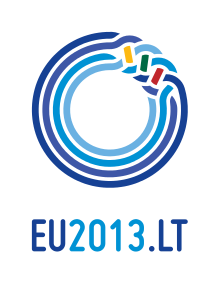
The Lithuanian Armed Forces are the military of Lithuania. The Lithuanian Armed Forces consist of the Lithuanian Land Forces, the Lithuanian Naval Force, the Lithuanian Air Force and the Lithuanian Special Force. In wartime, the Lithuanian State Border Guard Service becomes part of the Lithuanian Armed Forces. A special security department handles VIP protection and communications security.

Lithuania is a Northern country on the south-eastern shore of the Baltic Sea, a member of the United Nations Organisation, the Organisation for Security and Cooperation in Europe, the European Union, the North Atlantic Treaty Organisation, the World Trade Organisation. Currently, Lithuania maintains diplomatic relations with 186 states Lithuania became a member of the United Nations on 18 September 1991, and is a signatory to a number of its organizations and other international agreements. It is also a member of the Organization for Security and Cooperation in Europe, NATO and its adjunct North Atlantic Coordinating Council, the Council of Europe, and the European Union. Lithuania gained membership in the World Trade Organization on 31 May 2001.

The Baltic states or the Baltic countries is a geopolitical term encompassing Estonia, Latvia, and Lithuania. All three countries are members of NATO, the European Union, the Eurozone, and the OECD. The three sovereign states on the eastern coast of the Baltic Sea are sometimes referred to as the "Baltic nations", less often and in historical circumstances also as the "Baltic republics", the "Baltic lands", or simply the Baltics.

The Lithuanian Soviet Socialist Republic, also known as Soviet Lithuania or simply Lithuania, was de facto one of the constituent republics of the Soviet Union between 1940–1941 and 1944–1990. After 1946, its territory and borders mirrored those of today's Republic of Lithuania, with the exception of minor adjustments of the border with Belarus.

Lesbian, gay, bisexual and transgender (LGBT) people in Lithuania face legal challenges not experienced by non-LGBT residents. Both male and female same-sex sexual activity are legal in Lithuania, but neither civil same-sex partnership nor same-sex marriage is available, meaning that there is no legal recognition of same-sex couples.

The Act of the Re-Establishment of the State of Lithuania or Act of March 11 was an independence declaration by Lithuania adopted on March 11, 1990, signed by all members of the Supreme Council of the Republic of Lithuania led by Sąjūdis. The act emphasized restoration and legal continuity of the interwar-period Lithuania, which was occupied by the Soviet Union and annexed in June 1940. In March, 1990, it was the first of the 15 Soviet republics to declare independence, with the rest following to continue for 21 months, concluding with Kazakhstan's independence in 1991. These events led to the dissolution of the Soviet Union in December 1991.

Poland and Lithuania established diplomatic relations from the 13th century, after the Grand Duchy of Lithuania under Mindaugas acquired some of the territory of Rus' and thus established a border with the then-fragmented Kingdom of Poland. Polish–Lithuanian relations subsequently improved, ultimately leading to a personal union between the two states. From the mid-16th to the late-18th century Poland and Lithuania merged to form the Polish–Lithuanian Commonwealth, a state that was dissolved following their partition by Austria, Prussia and Russia. After the two states regained independence following the First World War, Polish–Lithuanian relations steadily worsened due to rising nationalist sentiments. Competing claims to the Vilnius region led to armed conflict and deteriorating relations in the interwar period. During the Second World War Polish and Lithuanian territories were occupied by both the Soviet Union and Nazi Germany, but relations between Poles and Lithuanians remained hostile. Following the end of World War II, both Poland and Lithuania found themselves in the Eastern Bloc, Poland as a Soviet satellite state, Lithuania as a Soviet republic. With the fall of communism relations between the two countries were reestablished. Since then relations have been friendly and akin to strategic partnership in defence and security.
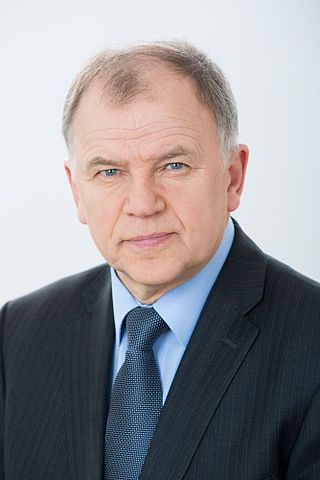
Vytenis Povilas Andriukaitis is WHO Special Envoy for the European region, the former European Commissioner for Health and Food Safety, a heart surgeon, a co-signatory to the 1990 Act of the Re-Establishment of the State of Lithuania.

China–Lithuanian relations are the bilateral foreign relations between the People's Republic of China (China) and Lithuania. The PRC has a chargé d'affaires in Vilnius. In December 2021, Lithuania closed its embassy in Beijing.

Dainius Kreivys is a Lithuanian businessman and politician who served as the Minister of Economy of Lithuania from 2008 to 2011 and is a member of Seimas since 2012. He is a member of the conservative political party Homeland Union – Lithuanian Christian Democrats.

Dalia Grybauskaitė is a Lithuanian politician who served as the eighth president of Lithuania from 2009 to 2019. She is the first woman to hold the position and in 2014 she became the first President of Lithuania to be reelected for a second consecutive term.
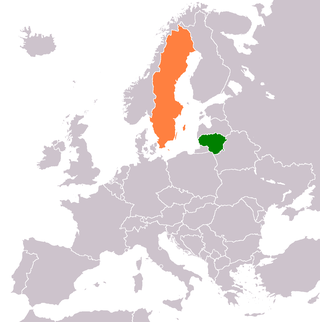
Lithuania–Sweden relations are the foreign relations between Sweden and Lithuania. Sweden has an embassy in Vilnius. Lithuania has an embassy in Stockholm.

Denmark–Lithuania relations refers to the historical and current diplomatic relations between Denmark and Lithuania. Lithuania has an embassy in Copenhagen, and Denmark has an embassy in Vilnius. Denmark first recognized Lithuania in 1921 and again on 28 February 1991 after the fall of the Soviet Union. Diplomatic relations were established on 24 August 1991. Both countries are members of the European Union, NATO, Organization for Security and Co-operation in Europe and Council of Europe.

Nordic-Baltic Eight (NB8) is a regional co-operation format that includes Denmark, Estonia, Finland, Iceland, Latvia, Lithuania, Norway, and Sweden. Under NB8, regular meetings are held of the Baltic and Nordic countries' Prime Ministers, Speakers of Parliaments, Foreign Ministers, branch ministers, Secretaries of State and political directors of Foreign Ministries, as well as expert consultations where regional issues and current international topics are reviewed.
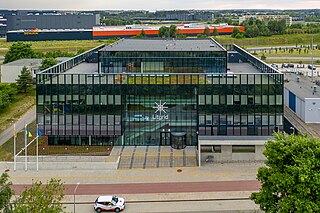
Litgrid AB is a Lithuanian electricity transmission system operator that operates Lithuania's electricity transmission grid. Litgrid is responsible for the integration of the Lithuanian electricity system into the European electricity infrastructure and the common electricity market.
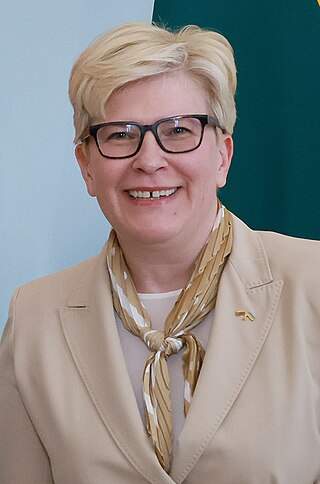
Ingrida Šimonytė is a Lithuanian politician, public servant and economist who is the 17th and current prime minister of Lithuania since 11 December 2020. She has been a Member of the Seimas for the Antakalnis constituency since 2016 and was Minister of Finance in the second Kubilius cabinet from 2009 until 2012. Šimonytė was a candidate in the 2019 presidential election, but lost in the second round runoff to Gitanas Nausėda. She has been a member of Homeland Union since 2022, having previously been an independent politician.
The Diplomatic Service of the Republic of Lithuania is the part of the governmental service tasked with enforcing the foreign policy set by the President, the Parliament, and the Government of the Republic of Lithuania. The head of the service is the Foreign Minister.

Gitanas Nausėda is a Lithuanian politician, economist and banker who is serving as the ninth and current president of Lithuania since 2019. He was previously director of monetary policy at the Bank of Lithuania from 1996 to 2000 and chief economist to the chairman of SEB bankas from 2008 to 2018.
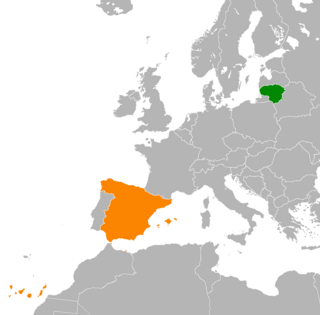
Lithuania–Spain relations are the bilateral and diplomatic relations between these two countries. Relationships are mainly defined by the membership of both countries to the European Union and to NATO. Lithuania has an embassy in Madrid and honorary consulates in La Coruña, Albacete, almería, Barcelona, Bilbao, santa Cruz de Tenerife, Valencia. Spain have an embassy in Vilnius since December 2013.
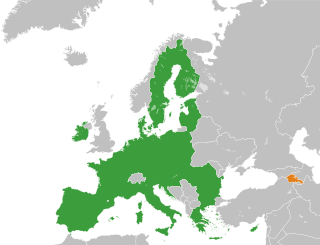
The Armenia–EU Comprehensive and Enhanced Partnership Agreement or CEPA is a partnership agreement between the European Union and Armenia. The agreement advances the bilateral relations between the European Union and Armenia to a new, partnership level and regulates cooperation in political and economic sectors, while enhancing trade relations. The agreement develops these areas further, providing a long-term basis for integrating and strengthening EU–Armenia relations. The agreement is also designed to bring Armenian laws and regulations gradually closer to the EU acquis.
